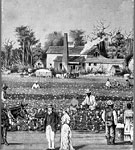
|

|
Roxy, the leading mother figure in Puddn'head Wilson, is the naive yet manipulative mother of Thomas Driscoll. One the few actual mothers in Twain's fiction, Roxy allows us to get a closer look inside the nature of a mother son relationship. The plot of Puddn'head Wilson rests on the fact that although "for all intents and purposes" Roxy was white, the law dictated that her one sixteenth parts negro kept her a negro. The same law resulted in her son receiving a similar fate. Infuriated by the thought of her son growing up a slave and potentially being sold down the river, Roxy secretly switched her son with her master's since even he could not tell the difference. Ironically, the switch placed her in the awkward position of raising her master's son as her own and being a slave to her own child - who would grow up as Tom Driscoll.
The first impression we are given of Roxy is of a noble and loving figure. The narrator first introduces her,"She was of majestic form and stature; her attitudes were imposing and statuesque, and her gestures and movements distinguished by a noble and stately grace"(64). The narrator continues to describe her assumed nobility despite her actual servant status, "She had an easy, independent carriage - when she was among her own caste - and high and 'sassy' with all"(64).
At first she appears as a hero, who in a moment of passion, cleverly switches the babies to save her own child from the fate of being sold down the river. Unfortunately, the idea turns sour and she becomes the victim of her own naiveness. Not only does her real son become the joke of the town, he also grows up to be an unsympathetic master, who maliciously whips and beats her. Her naivete next surfaces when she invests all her hard earned money from working on the steamship in the bank and then the bank "had gone to smash and carried her four hundred dollars with it"(101). Although this financial blunder may indicate financial unawareness more than ignorance, since even Clemens found himself in similar financial dire straits, it does indicate a certain lack of awareness nevertheless.
The final evidence to Roxy's naiveness can be seen in the continual faith she shows in her son. After losing all her money, she returns to Dawson's Landing counting on the the good will of her son Thomas to help support her. Of course, this naive assumption gets thrown back in her face when he tells her to get out of his sight. Finally, she has to resort to manipulation by threatening to expose his gambling debts to his uncle and then, if necessary, his true identity as her slave son. Thomas pleas to her motherly instincts not to expose him which, surprisingly, leads her to volunteer to go back into slavery so he can pay off his debts:
"Ain't you my chile? En does you know anything dat a mother won't do for her chile? Day ani't nothin' a white mother won't do for her chile. Who made 'em so? De Lord done it. En who made the niggers? Se Lord made'em. In de' inside, mother's is all the same. De Lord he made'em so. I's gwyne to be sole into slavery, en a year you's gwyne to buy yo'ole mammy free ag'in. I'll show you how. Dat's de plan."(174)
Once again, her motherly impulses to save her child from harm get in the way of common sense. Naively trusting her son to buy her back after he takes care of his debt, he betrays her and sells her down the river. Although Roxy's display of unconditional love and sacrifice can be admired on one hand, it also demonstrates a certain motherly blindness when it comes to judging the character of her own son.
The most important dynamic of motherly relationships which Roxy displays and that the others do not is the element of control. Since the other mother figures we have looked at are aunts, the nature of the control they exert on the boys seems to be fairly limited. Although Roxy's control of her son is also somewhat limited by her slavehood, the relationship between Roxy and Tom is the closest thing to an unrestricted mother-son relationship we have seen so far. When Roxy proclaims that,"You is the low-downest orniest hound dat was ever pupp'd into dis worl' - en I's 'sponsible for it!"(189) to Thomas, Roxy feels she has a certain inalienable right to be brutally honest with him. In addition to having this right, she also feels that she has the right to order him around - "Now I'll tell you what you's gwyne do"(189). Where the other mother figures use an arsenal of pleas and tears in their attempts to control the boys, Roxy utilizes a unrestrained, no nonsense, hard lined approach. This type of interaction, albeit dysfunctional at times, could only exist in a genuine mother-son relationship.
Since Roxy filled the role of mother figure, she can be associated with the following characters:
 |
 |
 |
|
|
|
|
|
|
|

|